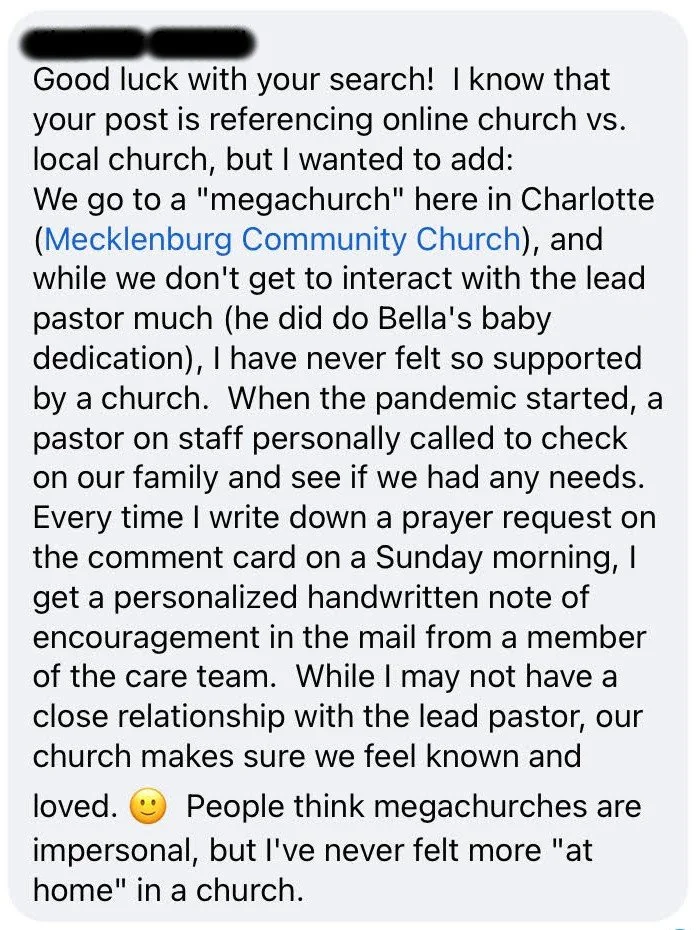Would Your Church Get an “F”?
If someone went to your church, would they grade you with an “F”? Not an “F” for “failed,” but rather an “F” for “friendly”? It’s one of the most important grades you can ever get and one our church strives toward with enormous intentionality.
A common assumption regarding large churches is that they are cold and unfriendly. I’m not sure why this assumption is made. Perhaps some believe that size negates warmth. Or that you must have lots of organic interaction with the senior pastor to truly be “pastored” or cared for.
The truth is that big churches become big because the opposite is true. If they weren’t friendly, caring, shepherding churches they would never have achieved their size. Something is working in terms of getting people connected, providing spans of care, and serving people at their point of need. Friendliness doesn’t flow through a single person, but instead a community of people.
(And, if we’re going to be honest, sometimes the reason a small church is small is because it isn’t friendly but instead closed and cliquish.)
For any size church, it’s all about intentionality. I was reminded of this anew when a member of our social media team sent out the following to some of our staff. It was a comment on a Facebook post about looking for churches:
Friendliness matters.
There’s an older study (but one that is still telling) that was conducted by Technical Assistance Research Program study for the White House Office of Consumer Affairs. It found that 96% of unhappy customers never complain about rude or unfriendly treatment, but 90% of those unhappy people will not return to the place where that unfriendliness was manifest. Further, each one of those unhappy people will tell 9 other people about the lack of friendliness and courteousness, and 13% will tell more than 20 other people.
A later study by the same organization discovered that the number one reason why individuals do not return to a particular establishment is an indifferent, unfriendly employee attitude.
(The actual results regarding why customers did not return to a particular establishment were as follows: 1% died, 3% moved, 5% due to friendship, 9% due to competition, 14% as a result of product dissatisfaction, and 68% as a result of an indifferent, unfriendly employee attitude.)
Now every church wants to be friendly. I’ve never met a church yet that said, “Yeah, we’re mean as heck and proud of it!”
Every church thinks it’s friendly, but what that means is...
... they are friendly to each other,
... or they are friendly to people they know,
... or they are friendly to people they like,
... or they are friendly to people who are like them.
That’s not friendliness—that’s a clique or, at best, a club.
People today are hungry for relationships, hoping for a network of people to be family and friends. Churches must reach out, include and accept, for the sake of Christ. This needs to be a cultivated part of your DNA. That’s why you should start an entire ministry around it if you haven’t already. We call ours “Guest Services,” and it oversees greeters, ushers, hospitality and so much more, all geared toward the experience of friendliness and acceptance. At Meck, it’s one of our largest and most strategic efforts that even envelops a two-mile radius around our campus. From that point forward, on a weekend, we strive to reach out and welcome people in.
After all, our goal is simple:
“I’ve never felt more at home.”
James Emery White
Sources
James Emery White, What They Didn’t Teach You in Seminary (Baker), order from Amazon.
1985 Technical Assistance Research Program (TARP) study for the White House Office of Consumer Affairs.
1988 Technical Assistance Research Program (TARP) study for the White House Office of Consumer Affairs.


